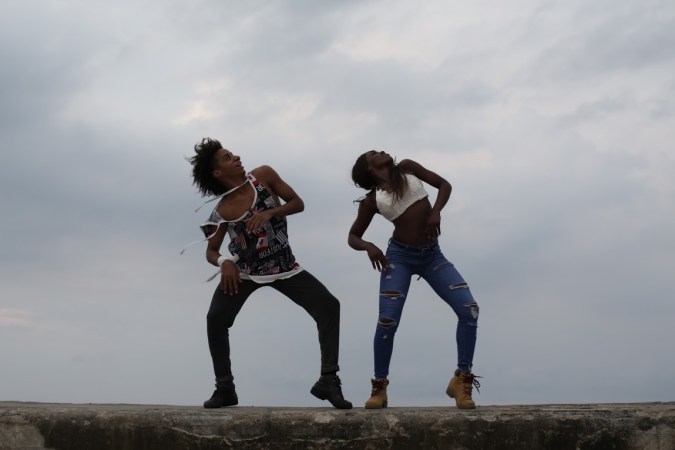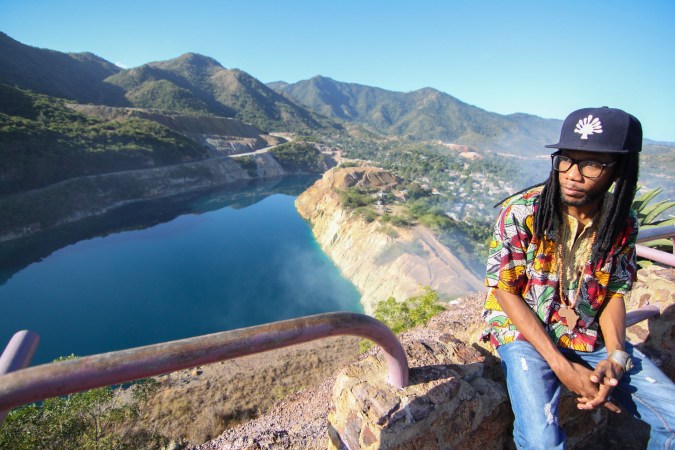Music from Cuba and the African continent is at the center of Puerto Rican director Eli Jacobs-Fantauzzi’s three documentary features to date, all of which were produced by his brother Khalil Jacobs-Fantauzzi. As Afro-Latinos with roots in the Caribbean themselves, the intersection between these two identities interests them profoundly.
Through their long-standing relationship with independent artists on the island, the duo has witnessed firsthand the symbiotic exchanges of rhythms between these two culturally connected regions. Following Inventos: Hip Hop Cubano and HomeGrown: HipLife in Ghana, their newest film exploring unique sounds, Bakosó: Afrobeats of Cuba, feels like a third installment in an unofficial trilogy of sorts.
Isnay ‘DJ Jigüe’ Rodriguez, our guide through a fascinating sonic labyrinth, returns to his hometown of Santiago de Cuba to meet with the emerging voices in a genre christened by its creators as Bakosó. It’s neither conga nor reggaeton, but a fusion between local and imported beats that compels everyone to dance.
“‘Bakosó’ is a colloquial term that refers to a party, a get down, but also carries a religious meaning derived from the Yoruba traditional story known as ‘Oba Koso’ (the king is not dead) that relates to the deity Shango and a celebration in his honor,” Eli tells Remezcla at the Miami Film Festival, where the film recently screened.


“It’s impossible to detach spirituality from the music, from the culture, from the reality of being Afro-Cuban. Santería and other Afro spiritual practices have had a very key role in preserving our African culture and our African languages,” adds Kahlil.
With the vast majority of Santiago’s population having African ancestry, as well as a close connection with other Afro-Caribbean countries like Haiti and Jamaica, the adoption of the concept is more than natural. “In the United States, when we talk about Cuba we think of Havana. But Santiago is a whole other universe. They call it ‘la tierra caliente.’ It has more of an Afro-Caribbean vibe,” says Kahlil.
Due to Cuba’s political system, which allows African men and women to study at its medical universities, the interactions between Afro-Cubans and African nationals has increased, resulting in rhythms like Kuduro, Azonto and Afro-Pop arriving in Latin America. The cultural cross pollination has been such that on May 25 Cuba celebrates the Día de Africa across campuses with performances and food from a variety of African countries.
As Eli points out, previous generations of Cuban musicians needed validation from the U.S. and European markets in order to succeed and gain exposure. Today, though, technology has democratized not only the creation but also the global distribution and marketing of all kinds of artistic production. “Cuba can now connect directly with musicians, dancers and folks back in the continent to exchange culture and music,” says Eli.

For the Fantauzzi brothers, it was not about giving DJ Jigüe and those other visionaries a voice, but amplifying the one they have. Namely, their musical concoctions. Eli believes that most mainstream documentaries are about extracting stories from communities, particularly those of color, perpetuating colonialism in the modern age. He doesn’t want to make himself the protagonist. He wants to capture what it looks like when those communities are able to tell their own stories. His role, he notes, is to provide whatever resources he can to uplift the movement where Bakosó came from.
They consciously decided to work with a Cuban film crew. Rather than collecting footage and taking it elsewhere for completion, they involved their Cuban partners in storytelling at every step. “We are interested in what’s called ‘just storytelling,” he explains. “When I make a film I think it’s a must to bring it to the people first and say, ‘Does this represent you? Is this your voice? Is this how you want to be projected in the world?’ And once they say, ‘Yeah that’s us,’ we take it out into the world.”
Acting as a tool to deepen the bonds, Bakosó: Afrobeats of Cuba has now screened around the world, especially in the Americas and Africa, from Belize and Guyana to Trinidad and Nigeria. Such globe-trotting merely echoes the film’s commitment to tracking how art travels nowadays. Choreographers in Angola, who originally influenced Cuban dancers, are now being influenced by Cuban dancers through Bakosó videos, demonstrating that culture doesn’t come from one direction. It can come, be transformed, and be sent back.
“It’s really interesting to see Jigüe be influenced by a song performed at the Día de Africa gala, then go back to Havana and create a remix of it, and then go to New York and play that remix for Afro-Latinos there,” says Eli. “One of the beautiful things about keeping music and traditions alive is remaking them.”
Bakosó: Afrobeats of Cuba screened as part of the Miami Film Festival.




